Hello,
Well! That’s quite a huge long laundry list of issues. Has anyone done a FeLV/ FIV test? What does the blood work look like?
While no one can rule out a polyp without a scope or ct scan this does sound like a long list of issues and I worry there is an underlying issue causing many of them. I would ask your vet to sedate her and look behind the soft palate to see if there is a visible polyp that might be able to be removed with traction avulsion. Otherwise I think the retro flex endoscopy and ct are the only way to diagnose. Although I would ask some very hard and direct questions about what can actually be done if they’d one it buried dee within the nasal cavity? I hope this helps.
Cat with feeding tube vomits water and food post surgery.
Hello, my cat had a squamous cell carcinoma removed from the left side of his face. He wasn’t interested in food or water after the surgery, so the vet installed a feeding tube. After one day of tube feeding, he started vomiting everything out – can’t hold down water or food. He was treated for nausea twice – with a Serenia injection one day, and with Zorfan (forgive the spelling errors) on the following day, but he continues throwing up (within minutes of administration of the medication. He hasn’t pooped for 11 days now, but x-ray found stool in his colon – but he is too weak to excrete it. So currently he is at the ER on IV fluids. Any ideas on why his vomiting can’t be treated? Could he have a gag reflex to the feeding tube? Is there an alternative to tube feeding (he won’t eat or drink on his own). Thank you.
Comments
My vet strongly suspects my cat has a nasal polyp. She has be snoring/snarling consistently for 2.5 years, but is otherwise fine. When it began, I first had a potential infection treated with two antibiotics, followed by a teeth cleaning, that yielded no issues with the teeth, and ended with a nasal flush. My vet was hoping to be able to see and grab the polyp during the flush, but couldn’t. Because she was otherwise healthy, eating, and playing, I went without treating it. Recently, she was treated for a G.I. flair up that had her not eating. She had begun not eating or moving get bowels for days. Once vomiting was added in, I took her to Metropolitan Emergency Vet. They gave her an ultrasound, saw the inflammation and gas in her abdomen, took a CBC, gave her fluids and nausea medication and sent her home a couple hours later for $800. Her bloodwork was was fine, aside from dehydration. She continued not to eat, so I brought her to my vet a day and a half later. They did an x-ray and saw the lower intestine looked aggravated. They kept her for the weekend and gave her fluids and more nausea medication. She returned to me after two days and began eating again at home. I’m awaiting the additional $600 bill for that. While being discharged, one of the docs urged me to address what she felt strongly was likely a polyp in her nasal cavity, as she believed it may now be large enough that it’s limiting her ability to smell, which may have contributed to the refusal to eat with the G.I. issue coexisting for a few days. She referred me to the specialty docs locally to have the nasal polyp removed. They are quoting me $3,195 plus. They said it would be $195 for a internal med consult, $1,500 for a “necessary” CT, and $1,500 or more for the Rhinoscopy. My vet said Lilah is otherwise a healthy 12 year old cat. I am sick with the cost, as I will need to put it all on a credit card. I have called around to multiple other specialty vets and I’m getting comparable quotes. I have had family members suggest I euthanize my cat over a nasal polyp, which I absolutely will not do. I stumbled across a Utube video of you removing a nasal polyp, so I tracked you down by name, wondering if you could help Lilah? I’m two hours from your practice, which is close enough. I’d really appreciate you getting back to me. As of now, we have a consult scheduled for 3/4, and I’m sick over the cost.
Thank you,
Diana Maginn
Comments
I have a two year old male yellow lab that has already had two obstruction surgeries. Both of these, Scout stopped eating and drinking and was vomiting. Last week we believe he ate a sock in which he has been eating on and off, he is drinking, peeing and is pooping. He wakes up every morning wagging his tail and is in good spirits, just lacking some energy on the days he doesn’t eat. He weighed 80 pounds on his previous checkup, yesterday we took him to our local vet, he weighed 70 lbs. The performed an x ray on him and said they believe it was a soft material that he swallowed and couldn’t determine if it was in his intestine or in his colon. While at the vet Scout was wagging his tail, holding the leash in his mouth as he usually does and ate about 20 treats. My vet charged me $360 and told me they recommend me to go to the animal hospital for an ultrasound to get a better idea of where this sock is located. I waited for 4 hours for them to tell me that they performed the ultrasound, it was somewhat inconclusive, his colon was enlarged and recommended exploratory surgery. I requested we wait to see if he will pass this. They kept him overnight, asked for an $800 deposit and called this morning saying that he was the same, and took x-rays to say it hasn’t moved. Your thoughts, suggestions or advice?
Comments
Kitten with completely atonic colon, possible causes? (Long text ahead)
So Nov. 3th in the evening we got 2 kittens, estimated 6 weeks old, thin. However due to being cold outside they already had very thick fur, so it wasn’t visible how thin they were. Weight was 550 & 650gr.
The finder said they have been more active before and only now they were able to get those two. They borrowed to live traps to get the mother and another kitten.
Both were seen eating. They were treated against worms (Milbemycinoxim/Praziquantel) and fleas (Lotilaner)
Nov 4th: Overnight everything was eaten, poo was solid. Kittens were responsive and alert. To the evening only half was eaten. Poo was still solid.
Nov 5th: Nothing was eaten over night, the little one seemed a bit weaker. I started to feed them with a syringe. They started with diarrhea, but that sometimes happens when feeding with a syringe.
Nov. 6th: They still don’t eat by themselves. The smaller one still seemed weaker, but otherwise it seemed fine. A bit diarrhea. In the evening I found it the litter box, not being able to stand, barely reacting. It hat vomited (at least it looked like it), and still had poo stuck on it. It was immediately brought to a vet. It received glucose solution s.c., something against vomiting, pain and an antibiotics. Lung sounded free, heart (ultrasound) was fine, too. A test of parvovirosis came back negative. I took both of them home that night, so I could feed it smaller portions more often and to give more fluids. 2 hours later to was able to stand again. I fed them every 3-4 hours, fluids every 6 (only small amounts obviously). It was lying on a warmth mat. The bigger one was fine, but avoided it’s litter mate.
Nov. 7th: No further improvement. None of them was eating on their own. The smaller one was still lying down most of the time, sleeping, but would react when I came to feed them. It would stand up and walk to the litterbox between the feedings, but the poo had a weird consistency. Not really diarrhea, but veeeery sticky, so it always carried it back to it’s sleeping place. So I had to clean it before every feeding. A test on giardia was positive, treatment started with Carnidazol. Continue to feed them with a Syringe and fluids for the smaller one. Fluids were always absorbed to the next feeding, but it still was a bit dehydrated (skin fold test). The bigger one would play in between and seemed fine otherwise.
Nov. 8th: No changes in the smaller one during the day, still weaker, able to walk, sit and stand, but sleeping most of the time. Today there was rarely poo in the toilet. I assumed that the treatment started working and it was a good sign (although I already had the feeling that something was wrong… wish I would have trusted that feeling). In the evening it seemed weaker, but would still accept being fed with a syringe. It felt different, less body tension, but would still walk away/go to the t. 10pm feeding. More calm, didn’t want to eat that much, peed on me. Meowed louder during giving the fluids than usual and tried to get away. 2am clock, the fluids weren’t absorbed completely, it’s abdomen felt like a sponge. I only fed a tiny amount. 6am weaker, would lie down immediately, breathing was shallow and faster, meowing, I didn’t feed it, fluids still not absorbed. Rushed to the vet.
-> Heart had a low frequency, breathing fast and shallow
-> X-Ray lungs were free, only a tiny amount of fluids in the abdomen, however the complete colon and stomach were filled with food. There was no visible blockage or air.
-> Ultrasound: Absolutely no movement in the colon/stomach, no blockage or air seen either. Kidneys and liver seemed fine
-> Punctation of the abdomen: ca. 3-4ml of fluids, lots of proteins, a bit of blood. Didn’t look like FIP. Possible that the fluids came out of the colon.
It was given something against vomiting, pain, antibiotics, something to help the cardiovascular system and something to get the colon moving again. To help with its breathing got a mask with additional oxygen. However in the next hour it got worse, so we decided to let it go. After it was gone food came back out of it’s mouth. And it didn’t even smell like it had started to digest.
It’s littermate is still with me and fine. It started to eat on its own yesterday.
Now I obviously ask myself what i could have done better/different. By now I think I should have started with additional syringe feeding earlier – at least with the smaller one. And I should have reacted when my feeling told me that something was wrong, even when there were no obvious changes yet. I somehow have the feeling that I sis something wrong and killed it. Did I give too much fluids (but lungs were free and only a bit fluid in the abdomen)? Did I feed too much? Other kittens eat even more without problems – and the other one is fine.
And what can be the causes for the complete stop of movement in the colon/stomach?
I know that FIP can cause this and an ileus (but there were no visible blockage, everything was filled with food), are there other causes? Can giardia do this?
Comments
I recently purchased a “furminator” brush for my cat with medium long hair so that I can brush her daily to help cut down on her hair balls. The brush works great! So, I am working on brushing daily and have purchased over the counter hair all control dry cat food to use with basic wet food. What is my next step if she is still vomiting Hair balls once in a while? Thanks!
Comments
My one year old cat threw up twice on August 23rd, but she was not acting lethargic and was still eating and drinking normally so I thought she maybe threw up because of a hair ball. She threw up again today twice, with one being a very small amount. She is not acting lethargic and is active and playing. She is also drinking normally but she has not eaten as much as normal. Both times she threw up when I was not at home. She did start eating when I got home today though. I also free feed her but haven’t had issues with her vomiting due to eating to fast or vomiting in the entire time I have had her (one year). I’m not sure what the cause of her vomiting could be.
Comments
I have a 12 year old cat who vomits almost every day since I adopted her 5 months ago. She has been to the vet several times and a sonogram revealed she has chronic pancreatitis. They didn’t see any other issues. She was eating canned Fancy Feast with water, but now I have her on NomNomNow because I thought fresh food would help her. But she is still vomiting. It’s usually food at first but then she moves spots and vomits bile or saliva/foam. Once or twice the saliva looked bloody (took her to the vet right after). The vet had her on vitamin E, pepcid, and a round of antibiotics. Nothing helped. She has never been very playful but she is behaving relatively normally, eats, grooms, poops, etc. I don’t know what else to do! Thanks for any advice!










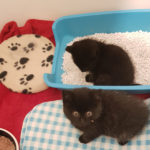
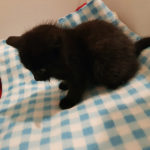

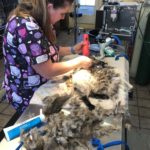
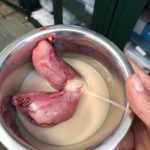



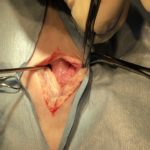
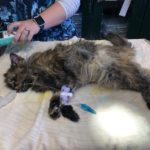
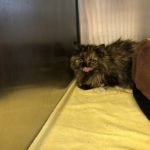

hello,
i am sorry this wasnt answered in a more timely fashion. I will try to answer it for others sake. I would say that the issue is the primary cause to the vomiting has still not been addressed or resolved.. I think its time for a review of the diagnostics you have run, xrays, blood work and possibly adding or rechecking an ultrasound. Also at some point we talk about biopsies of the stomach. I hope your kitty ended up doing ok.